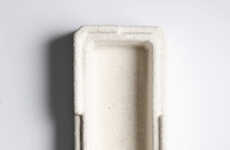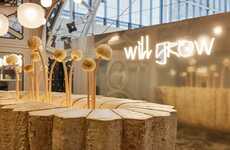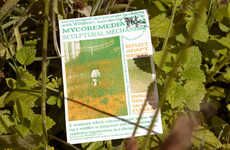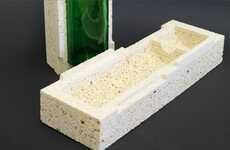
Mushroom Insulation Helps to Grow a House
Sarah St.Jules — July 12, 2013 — Eco
References: mushroomtinyhouse & treehugger
Styrofoam – and the world's dependence on it -- continues to be a massive concern ecologically and Ecovative’s Mushroom may be exactly what the world needs. By using mushroom roots to bond other products like corn stalks together, these products are then able to be a substitute to plastic foam.
It was through this idea that Ecolative attempted to use the Mushroom as insulation. It works in a completely different and exciting way. The Mushroom will grow into a wood form that will produce an air locked seal. Over the next month -- as it continues to dry -- it then produces an airtight wall that becomes very tough. This finished insulation is fire resistant, and since Mushroom is one single wall, the thermal protection is excellent. Ecolative has managed to produce the future of insulation and it looks really good for the environment.
It was through this idea that Ecolative attempted to use the Mushroom as insulation. It works in a completely different and exciting way. The Mushroom will grow into a wood form that will produce an air locked seal. Over the next month -- as it continues to dry -- it then produces an airtight wall that becomes very tough. This finished insulation is fire resistant, and since Mushroom is one single wall, the thermal protection is excellent. Ecolative has managed to produce the future of insulation and it looks really good for the environment.
Trend Themes
1. Eco-friendly Insulation - Utilizing mushroom insulation as a substitute for plastic foam presents an innovative and sustainable solution for eco-friendly construction.
2. Bio-based Materials - The use of mushroom roots to bond materials together opens up new possibilities for the development of bio-based construction materials with improved ecological impact.
3. Natural Building Methods - The growth of mushrooms into wood forms to create airtight seals offers a disruptive innovation opportunity for the natural building methods industry.
Industry Implications
1. Construction - The construction industry can explore the use of mushroom insulation and bio-based materials to create more sustainable and environmentally friendly buildings.
2. Eco-friendly Products - Incorporating mushroom-based insulation into eco-friendly product lines can provide a disruptive innovation opportunity for the eco-friendly products industry.
3. Sustainability - The use of mushroom insulation in construction aligns with the sustainability goals of the industry, offering a potential disruptive innovation opportunity.
3.7
Score
Popularity
Activity
Freshness















